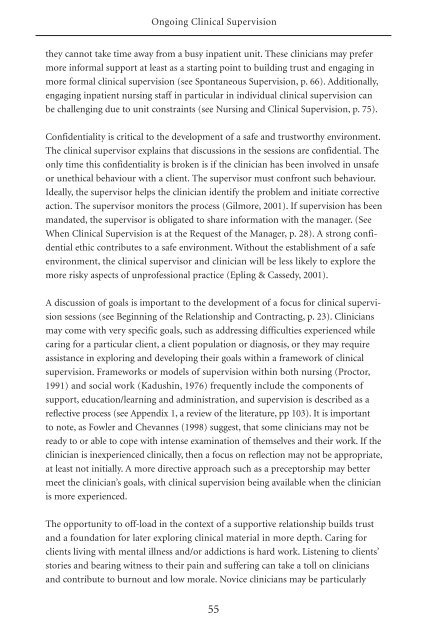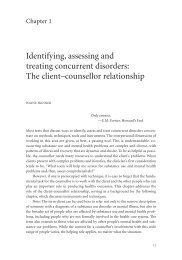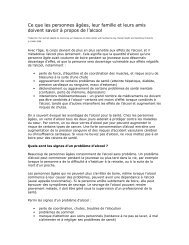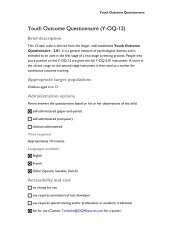Clinical Supervision Handbook - CAMH Knowledge Exchange ...
Clinical Supervision Handbook - CAMH Knowledge Exchange ...
Clinical Supervision Handbook - CAMH Knowledge Exchange ...
Create successful ePaper yourself
Turn your PDF publications into a flip-book with our unique Google optimized e-Paper software.
Ongoing <strong>Clinical</strong> <strong>Supervision</strong><br />
they cannot take time away from a busy inpatient unit. These clinicians may prefer<br />
more informal support at least as a starting point to building trust and engaging in<br />
more formal clinical supervision (see Spontaneous <strong>Supervision</strong>, p. 66). Additionally,<br />
engaging inpatient nursing staff in particular in individual clinical supervision can<br />
be challenging due to unit constraints (see Nursing and <strong>Clinical</strong> <strong>Supervision</strong>, p. 75).<br />
Confidentiality is critical to the development of a safe and trustworthy environment.<br />
The clinical supervisor explains that discussions in the sessions are confidential. The<br />
only time this confidentiality is broken is if the clinician has been involved in unsafe<br />
or unethical behaviour with a client. The supervisor must confront such behaviour.<br />
Ideally, the supervisor helps the clinician identify the problem and initiate corrective<br />
action. The supervisor monitors the process (Gilmore, 2001). If supervision has been<br />
mandated, the supervisor is obligated to share information with the manager. (See<br />
When <strong>Clinical</strong> <strong>Supervision</strong> is at the Request of the Manager, p. 28). A strong confidential<br />
ethic contributes to a safe environment. Without the establishment of a safe<br />
environment, the clinical supervisor and clinician will be less likely to explore the<br />
more risky aspects of unprofessional practice (Epling & Cassedy, 2001).<br />
A discussion of goals is important to the development of a focus for clinical supervision<br />
sessions (see Beginning of the Relationship and Contracting, p. 23). Clinicians<br />
may come with very specific goals, such as addressing difficulties experienced while<br />
caring for a particular client, a client population or diagnosis, or they may require<br />
assistance in exploring and developing their goals within a framework of clinical<br />
supervision. Frameworks or models of supervision within both nursing (Proctor,<br />
1991) and social work (Kadushin, 1976) frequently include the components of<br />
support, education/learning and administration, and supervision is described as a<br />
reflective process (see Appendix 1, a review of the literature, pp 103). It is important<br />
to note, as Fowler and Chevannes (1998) suggest, that some clinicians may not be<br />
ready to or able to cope with intense examination of themselves and their work. If the<br />
clinician is inexperienced clinically, then a focus on reflection may not be appropriate,<br />
at least not initially. A more directive approach such as a preceptorship may better<br />
meet the clinician’s goals, with clinical supervision being available when the clinician<br />
is more experienced.<br />
The opportunity to off-load in the context of a supportive relationship builds trust<br />
and a foundation for later exploring clinical material in more depth. Caring for<br />
clients living with mental illness and/or addictions is hard work. Listening to clients’<br />
stories and bearing witness to their pain and suffering can take a toll on clinicians<br />
and contribute to burnout and low morale. Novice clinicians may be particularly<br />
55

















